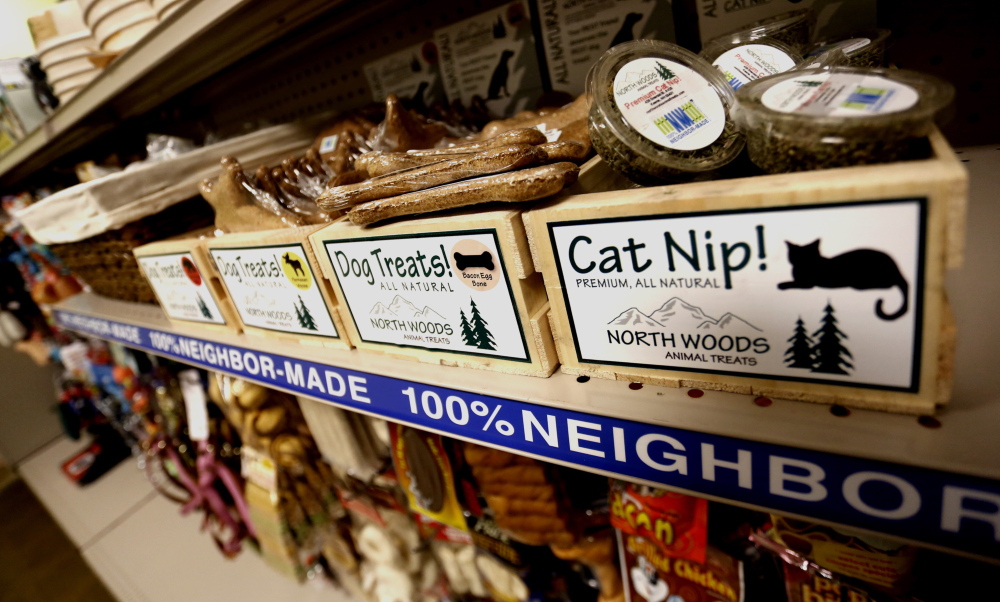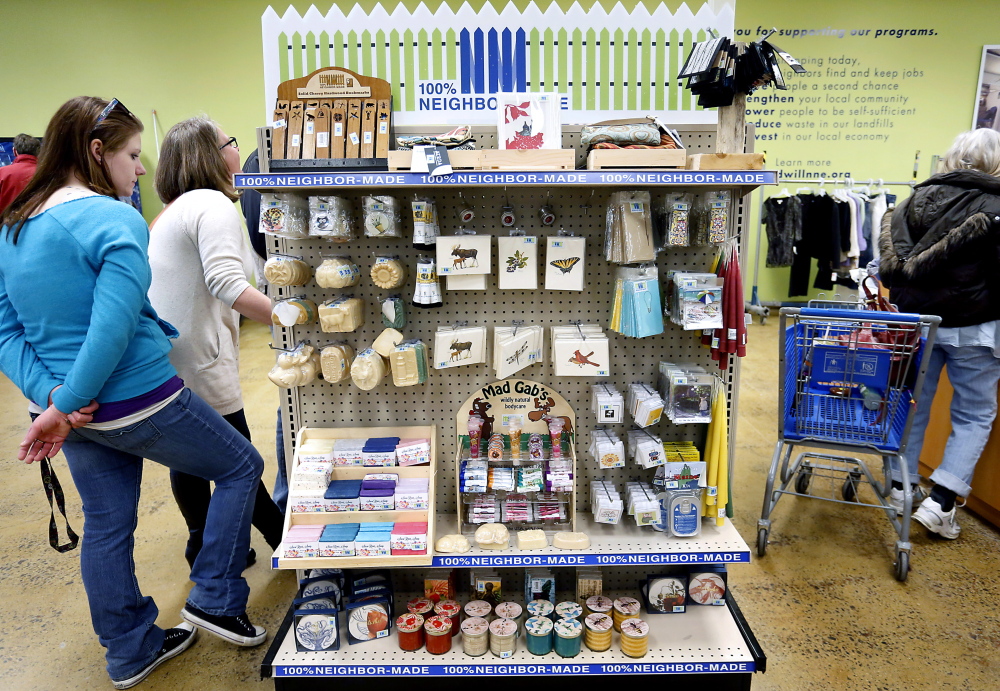Since the 1930s, Goodwill stores in northern New England have been go-to places for inexpensive clothes, shoes and household items.
The reason is clear: The stores have sold used, donated items at substantial discounts to support Goodwill’s social services programs.
Starting this week, that simple and effective business model is changing, with Goodwill introducing new products from local and regional companies.
The “100% Neighbor-Made” products include Mad Gab’s natural body care products, Flowfold’s wallets, pet treats, wooden toys, soaps, jewelry and other items from 29 companies based in New England.
“We’re trying to ensure sustainable communities,” said Ken Christian, a spokesman for Goodwill Industries of Northern New England. “It gets no better than trying to help local manufacturers and nearby businesses grow.”
Donated goods will remain the mainstay of Goodwill stores in Maine, New Hampshire and Vermont, Christian said, while sales of new, locally made products will give companies access to 27 more retail outlets – and Goodwill will get a new revenue stream.
Christian said 15 of the stores – including ones in Auburn, Augusta, Bangor, Ellsworth, Rockland, South Portland and Windham – will sell the full line of 100% Neighbor-Made goods, and 12 will have smaller sections devoted to the new products.
The goods will be sold at full retail price, he said, and will fit in with what a typical Goodwill customer might expect to spend – generally no more than $40 to $50 per item, with many selling for substantially less.
Christian said the focus on sustainability is based on supporting a local workforce, choosing manufacturers that use primarily locally sourced raw materials, and picking suppliers that are no more than a couple of hours from most of the stores, to reduce delivery costs.
Gabrielle Melchionda, who started Mad Gab’s nearly 23 years ago by making lip balm in her mother’s kitchen, said Goodwill’s approach gets her products before a new segment of the market.
Mad Gab’s products are adorned with whimsical drawings of Maine wildlife, such as moose and bears. That means they are geared toward tourists, who buy the products as keepsakes of their visits to Maine – presumably visits unmarred by chapped lips.
Melchionda said her products are usually sold in gift shops in other tourist spots. Selling at Goodwill stores “is a great way to get it in front of locals,” she said. “It’s one more place for them to find it.”
Melchionda said she’s not worried that Goodwill shoppers will think her products have been donated, especially with the new goods marketed in a separate section of each store and clearly identified as new.
“Consumers are smarter than you think – and you’re not going to sell used lip balm,” she said.
Melchionda said Goodwill earned a soft spot in her heart when participants in its rehabilitation program helped her finish a huge product run when her goods were featured on a QVC show about Maine products in 1997, which produced a flood of orders. She said she thinks of her participation in 100% Neighbor-Made as helping her business and Goodwill’s.
Charlie Friedman said teaming up with Goodwill will give broader exposure to his Flowfold wallets, which are made from sailcloth, carbon fibers and Kevlar so they’re sturdy enough for a camping or fishing trip.
“It’s definitely an awesome opportunity for us,” said Friedman, who designs the wallets and other products on Peaks Island and makes them in Lewiston.
He said most of his wallets are now sold in small “mom-and-pop” stores, so getting into a recognizable chain of more than two dozen stores could be a big boost.
He said his lowest-priced model costs about $20, which he figures will appeal to bargain-minded Goodwill shoppers.
Christian said selling new items isn’t unheard of for Goodwill. The stores usually sell some new “hard goods,” he said, such as garden tools, because those items aren’t regularly donated.
Even some clothes are sold new, he said, pointing out that used underwear never proved to be a big seller.
Edward D. Murphy can be contacted at 791-6465 or at:
emurphy@pressherald.com
Send questions/comments to the editors.





Success. Please wait for the page to reload. If the page does not reload within 5 seconds, please refresh the page.
Enter your email and password to access comments.
Hi, to comment on stories you must . This profile is in addition to your subscription and website login.
Already have a commenting profile? .
Invalid username/password.
Please check your email to confirm and complete your registration.
Only subscribers are eligible to post comments. Please subscribe or login first for digital access. Here’s why.
Use the form below to reset your password. When you've submitted your account email, we will send an email with a reset code.